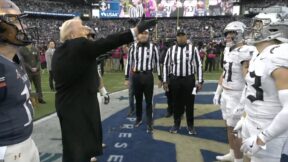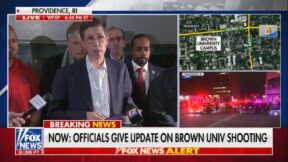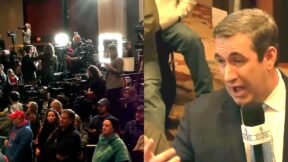Listen to Sonia Sotomayor Shut Down Clarence Thomas Question in Supreme Court Case on Racist Jury Selection
Supreme Court Justice Clarence Thomas asked a rare question during oral arguments in a case involving a racist prosecutor that was decided this week, but Justice Sonia Sotomayor quickly shut down what could have been a point in that racist prosecutor’s favor.
The Supreme Court issued a 7-2 ruling on Friday in the case of Flowers v. Mississippi, overturning the conviction of defendant Curtis Flowers because the court found that a lower court erred in ruling that prosecutors were not motivated by discriminatory intent when they struck Carolyn Wright — a black woman — from the jury.
Justice Brett Kavanaugh’s majority opinion summarized the facts of the case, which involved the striking of jurors using “peremptory strikes,” which are at the discretion of the lawyers, but which may not be used in a discriminatory way:
Petitioner Curtis Flowers has been tried six separate times for the murder of four employees of a Mississippi furniture store. Flowers is black; three of the four victims were white. At the first two trials, the State used its peremptory strikes on all of the qualified black prospective jurors. In each case, the jury convicted Flowers and sentenced him to death, but the convictions were later reversed by the Mississippi Supreme Court based on prosecutorial misconduct. At the third trial, the State used all of its 15 peremptory strikes against black prospective jurors, and the jury convicted Flowers and sentenced him to death. The Mississippi Supreme Court reversed again, this time concluding that the State exercised its peremptory strikes on the basis of race in violation of Batson v. Kentucky, 476 U. S. 79. Flowers’ fourth and fifth trials ended in mistrials. At the fourth, the State exercised 11 peremptory strikes—all against black prospective jurors. No available racial information exists about the prospective jurors in the fifth trial. At the sixth trial, the State exercised six peremptory strikes—five against black prospective jurors, allowing one black juror to be seated. Flowers again raised a Batson claim, but the trial court concluded that the State had offered race-neutral reasons for each of the five peremptory strikes. The jury convicted Flowers and sentenced him to death. The Mississippi Supreme Court affirmed.
The two dissenting justices were Thomas and Justice Neil Gorsuch, and although Thomas rarely asks questions during oral arguments, he did this time. It did not go well.
Thomas’ questions carried the suggestion that the defense acted similarly to prosecutor Doug Evans — who excluded 41 of 42 black prospective jurors — by striking white jurors, but Sotomayor swooped in and erased that suggestion in a hot second.
“Ms. Johnson, did you — would you be kind enough to tell me whether or not you exercised any peremptories?” Thomas asked Sheri Lynn Johnson, the attorney for Flowers.
“I was not the trial lawyer,” Johnson replied.
“Well, did your –were any peremptories exercised by the defendant?” Thomas asked, to which Johnson replied “They were.”
“And what was the race of the jurors struck there?” Thomas asked.
“She only exercised peremptories against white jurors,” Johnson replied, and added that “her motivation is not the question here. The question is the motivation of Doug Evans.”
But then Sotomayor cut in to point out that Evans’ actions had all but eliminated the possibility of the defense striking a black prospective juror.
“She didn’t have any black jurors to exercise peremptories against — except the first one?” Sotomayor asked.
“Except the first one,” Johnson replied.
“But so did the prosecutor, except that one?” Sotomayor said.
“Correct,” Johnson agreed.
“After that, every black juror that was available on the panel was struck by…” Sotomayor said.
“Yes, he struck one — he seated one African American juror, and at the very end struck one white juror,” Johnson replied, adding “When all of the evidence in this case is considered, just as in Foster versus Chapman, the conclusion that race was a substantial part of Evans’ motivation is inescapable, and the Mississippi Supreme Court’s conclusion to the contrary is clearly erroneous.”
Seven of the justices agreed.
Listen to the audio above, via the Supreme Court of the United States.




